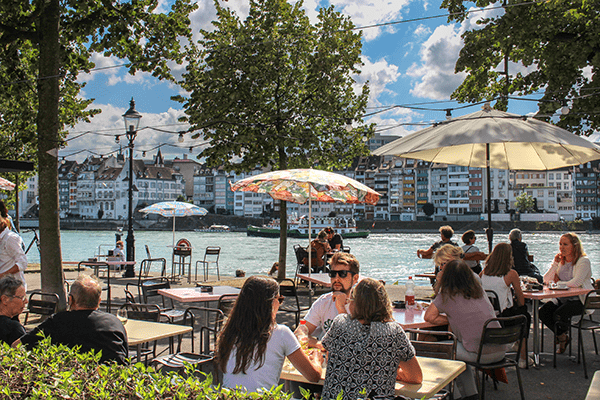What is life in Switzerland like?

Social etiquette in Switzerland
Swiss consider their homes very private. They don’t like to host coffee or dinner parties with strangers. Neighbors prefer to meet in common areas, such as the garden, parking spaces, or basement.
You are expected to be the first to move, and invite your neighbors over to meet you. A glass of wine and snacks suffice for an introduction. The Swiss are reserved and limit invitations to those they trust. This is an expression of respect for privacy and is not meant to offend. They will usually be delighted to have you as their guest to get to know each other better. Do not expect barriers to fall away immediately. This will take some time. There is great potential for friendships that will last a lifetime once you get to know the Swiss.
There are many differences in the behavior, expectations, and interactions of Neighbors and Colleagues with Friends, Family, and friends. It takes time to make friends with the Swiss. They are long-term-oriented.
Standard courtesies in Switzerland
- When you are invited to a dinner, bring a small gift like flowers or chocolate.
- For appointments, be on time or even 5 minutes earlier than usual.
- Wait for the host to toast you before pouring a glass of wine.
- Before you start a meal, say “bon appetit” / “guten Appetit” (‘enjoy your food’).
- Before you come in for a visit, please call and let your intentions know as others may have plans.
- Sunday is a day for rest and quiet activities are discouraged.
- Neighbors are grateful to be informed about your plans and invited to your party.
Is life in Switzerland perfect?
It is no secret that Switzerland is consistently ranked as one of the most desirable places to live in the world. The OECD Better Living Index 2021 found that Switzerland was above the average of OECD countries in subjective wellbeing, jobs and earnings income and wealth, social connections, and environmental quality. It also showed that Switzerland had better personal security, work/life balance, and housing.
The majority of Swiss are employed (80%), and they earn a decent salary. The average life expectancy of Swiss citizens is 84 years, four years more than the OECD. They are mostly happy with their lives. Citizens living in Switzerland were rated at 7.5 on a scale of zero to 10. The OECD average score is 6.5.
Nonetheless, like every country, even life in Switzerland has its perks.
First of all, the cost of living is quite high. Swiss citizens have a big household debt compared to the OECD average. Moreover, they are very risk-adverse people, meaning they spend a lot on insurance. Life insurance and groceries cost way more than in most developed countries.
Also there’s the matter of the culture’s strictness. Although the structure and pragmaticity of Swiss culture is easy to understand for most people, it can be difficult for expats in Switzerland to adjust to the rigidity of Swiss life. Swiss people are polite but reserved. You should, for example, use your last name and the formal Sie/Vous/Lei until you are specifically asked by your colleagues or business partners. The hierarchy of companies is a common feature. Only the most powerful people can make final decisions. This restraint extends to personal relationships as well. A recent survey of Swiss expats found that 62% find it difficult to make friends in Switzerland (compared to 36% worldwide). This is due to the fact that most Swiss people stay close to their friends. They are also very respectful of privacy and might delay inviting colleagues to meet them outside of work.
But if you can look over this, and if you are a quiet, reserved, hard-working person who enjoys the small pleasures of life and the dazzling landscapes, you’ll fit right home in Switzerland!